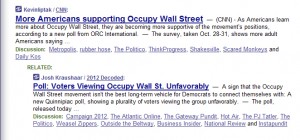Spotted on Memeorandum today (click image to enlarge):
The “pro” poll is by CNN/Opinion Research Corporation (ORC) and the “anti” poll is by Quinnipiac. Notice that mostly leftie bloggers link to the article suggesting favorable polling for OWS, and mostly rightie bloggers link to the article about the unfavorable poll.
I have no particular expertise at criticizing poll data, but note that the two polls did not ask exactly the same question. CNN/ORC tells us that Americans have a favorable view of OWS positions. Quinnipiac tells us that Americans have an unfavorable view of OWS.
Nearly any protest movement that can just hang in there inevitably grains credibility among the general population, for the sheer appearance of having unwavering principles and not just being the dirty hippies/crackpots/fools/lowlifes/extremists/whatever that their opponents, with the help of the media, make them out to be.
Hmm, is that really true? In my experience, if the movement itself doesn’t take great care to not reinforce negative media stereotypes, those negative stereotypes stick and much reduce the effectiveness of the protest movement. I’ll throw that open for discussion. I say the Bigger Asshole rule is still in effect.
Update: This is what I’ve feared all along. [Update: If Salon is being balky, try the New York Times. If stuff like this continues, OWS is over. It would be better to withdraw from public places and re-organize as a more conventional movement.

